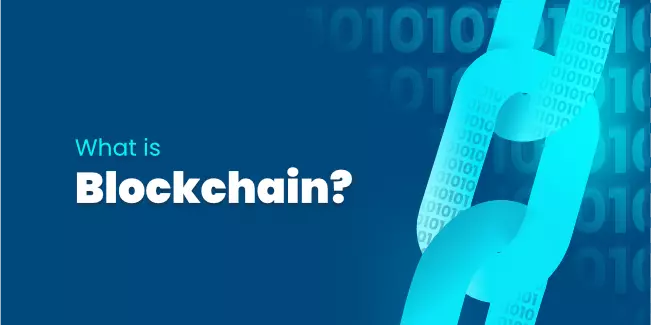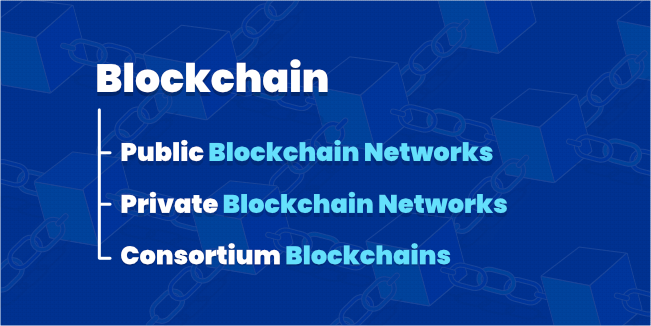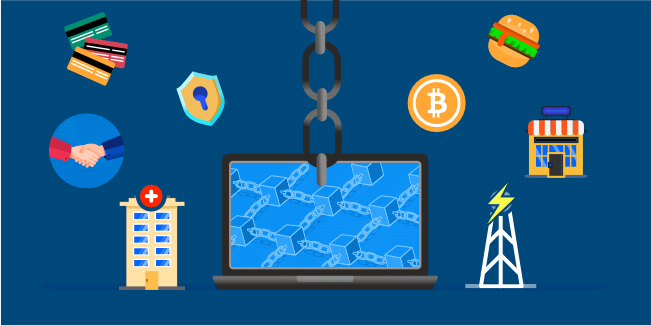What is Blockchain?

Blockchain is a word that appears more and more often in conversations about new, innovative technologies. It is widely believed that this technology is only related to the IT and Finance industry because it is there that a huge number of transactions and data to be processed and stored take place. However, the list of applications for blockchain technology is practically endless, and new ideas for its use appear every day.
But to be able to apply this solution, you must first understand it. For several years, blockchain has been on the list of trends in software development, and there is no doubt that it will stay with us for longer. Therefore, please read our article and learn the most important things about this technology.
What is Blockchain Technology?
Blockchain, or distributed ledger technology, is an innovative way to store and transmit online transaction data securely. This information is arranged in blocks linked together chronologically - like a chain. Blockchain has many uses, such as trading and buying/selling currencies (including cryptocurrencies) - any transaction can be sent through it.
Blockchain technology is a decentralized peer-to-peer system that allows multiple users to securely share and approve digital transactions without central management or intermediaries. The primary purpose of blockchain is to store an immutable record of all transactions in digital form in a distributed network with replicated copies by its participants. Any computer connected to the network can be used as part of the transaction verification process - providing secure authentication and trust within each shared ledger.
The ledger is secured against unauthorized access using state-of-the-art tools yet remains accessible to anyone. Users can view and confirm the entire transaction history from the inception of the blockchain to the present.
Blockchain technology has revolutionized the way transactions are conducted, from commodities to currencies. In addition, research is underway on using blockchain for digital signatures by government entities and as a general ledger in banks. This innovation allows transactions to be made outside traditional systems without needing a public trust institution. It enables direct communication between all parties involved in a given transaction. Blockchain technology is widely used in many industries, from finance to energy. It can securely store any transaction, such as digital currency like Bitcoin. The potential applications are limitless, and the possibilities for innovation with this technology offer exciting new opportunities.
Why is Blockchain Important?
Every business needs reliable data to drive its success. Blockchain allows quick access to accurate and secure information only authorized users can view as it is stored in a permanent ledger. Furthermore, this shared record system provides unprecedented transparency between network members. The power of blockchain technology comes from the ability to track data across a secure, transparent network. It allows businesses to accurately monitor payments, transaction data, accounts, orders, and production. Thanks to blockchain technology, companies increase their efficiency by minimizing errors resulting from manual processes and optimizing operations at all levels.
How does Blockchain Work?

The durability of blockchain transactions is undeniable. Each change of a single block makes it necessary to change the entire sequence that follows it. If anyone tries to manipulate the chain, alter data or enter unrestricted transactions, the blockchain nodes verifying this information will detect it. Since these changes do not match other entries in the ledger copies, they will be blocked from entering the blockchain. All data and transactions are resistant to various forgeries and manipulations, which is why the blockchain network is famous, among others, among financial institutions. It is estimated that to crack a blockchain network, and you would need computing power equal to half the Internet.
Regardless of the industry in which blockchain technology is used, its main elements of operation are always the same:
-
Each Transaction is a Block of Data
The data block stored in the blockchain database is highly customizable to record anything you want; this includes who, what, when, where, how much information, and any additional terms you need to know. Blockchain records every transaction that has ever taken place on its network. For example, the Ethereum blockchain is a record of all ether transactions that have ever taken place.
Each block is linked to the previous and following blocks, creating a data chain. Blocks validate the exact time and sequence of transactions, and blocks link together to prevent any block from being changed or another block from being inserted between two existing blocks.
-
The Data String is Irreversible
Each new block's increasing strength strengthens its predecessor's authentication, consequently perpetuating the entire blockchain. This meticulous process immediately identifies and rejects any potential fraud, securing an immutable ledger that all network users can trust. It eliminates the possibility of malicious interference by unauthorized parties - ultimately creating a reliable record of transactions that can be trusted implicitly.
Critical Elements of a Blockchain
Each blockchain consists of 3 main elements that are constant:
-
Distributed Ledger Technology
All participants in the network have access to a common ledger that stores every transaction, ensuring accuracy and eliminating redundancies common in existing business models. The distributed nature of the ledger ensures immutability, ensuring records are kept only once.
Once a transaction is recorded in the ledger, the participants cannot modify or damage it. If there is an error, a new transaction will be added to correct the mistake, and both records will remain visible to everyone. That is why data stored on a blockchain network is described as “immutable.”
To promote faster and more reliable transactions, a set of standard regulations - known as smart contracts - are stored securely on the blockchain. These contracts range from transferring corporate bonds to paying for travel insurance or other services. Smart contracts enable fast and smooth business operations without requiring manual data entry or supervision.
Types of Blockchain Networks

There are different types of blockchains. There are generally three types of blockchains: public, private, and permission-based or consortium blockchains.
-
Public Blockchain Networks
Public blockchains like Bitcoin are open to anyone who wants to join and participate. Unfortunately, these forms of blockchain have several disadvantages: they consume a lot of computing power, lack privacy in transactions, and offer poor security measures. It should be noted, however, that many modern blockchains remain public.
-
Private Blockchain Networks
With Private Blockchain Networks, a single entity controls who can join the network, implements the consensus protocol and maintains a common ledger.
The benefits include greater security as there are fewer participants due to better identification and control. In addition, changes are easier to implement, and transactions are faster.
A consortium blockchain is also called a permission-based blockchain. This type of network requires operator permission to connect and perform various functions. It means that multiple organizations can share the responsibility for maintaining the blockchain. A consortium blockchain is ideal for a business where all participants need authority and shared responsibility for the blockchain. Anyone with permission can work on such a blockchain.
Where can Blockchain Technology be used?

Blockchain technology is not only widely used in finance but also has a myriad of other beneficial applications. For example, hospitals have begun to use this state-of-the-art technology to record medical data and guarantee accuracy. In addition, agricultural companies take advantage of their logistical capabilities by tracking their food supply chain with precision and efficiency.
The energy sector has discovered the great potential of blockchain technology. It is now using it to facilitate transactions between small-scale producers and their consumers. Blockchain offers an ideal payment platform, providing a secure buying and selling method.
Blockchain technology has opened the door to an exciting new world of possibilities, with applications across many industries. Potential areas of development include voting systems, currency exchange and interbank transactions, transport, digitization of documents, identity verification, and government services.
Conclusion
With the constant development of technology, blockchain has become more relevant than ever. However, the full potential of this extraordinary revolution has yet to be unleashed. Currently, governments around the world are investing heavily in innovative projects using blockchain solutions. It says a lot about its importance and illustrates how important it will become in the future. Blockchain technology is becoming one of the most important trends in digital innovation since the rise of the Internet.